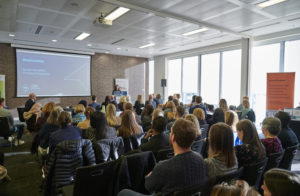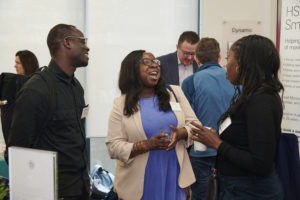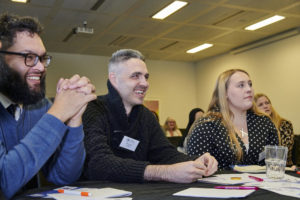Our teacher conferences took place in November in London and Manchester. These events are an important time in the YE calendar. Year-on-year, we hear that having opportunities to network, hearing from like-minded schools and colleges, and sharing ideas is invaluable. Book clubs, market stalls, swap shops, chicken coops, allotments, school shops, cafes, farming projects and independent living suites are just some of the incredible projects we had the good fortune of hearing all about. Included below are just some of these brilliant examples of embedding #FincaicialEduction into the curriculum.
Message from Sarah Porretta – Our New CEO
“Our vision at Young Enterprise is to ensure that every young person has the opportunity to learn the vital skills and enterprising mindset needed to earn and look after their money and make a positive contribution to their community. As teachers, you are absolutely vital to bringing this vision to life. Thank you all so much for your support at this year’s events and for the incredible work you do every day.”

We had some wonderful schools share their journey:
London:
- Lorraine Dalton and Kate Sturdy are the Principal and Vice Principal at Ysgol Bryn Gwalia, a small primary school in Wales that has seen a 4% increase in attendance and notable improvement in attainment since embedding their school rewards system and shop. The shop is run by their year 6 pupils as part of the Centres of Excellence programme, where they have embedded financial literacy across the entire school.
- Wakib Ullah at Royal Greenwich Trust School leads all school enterprise initiatives. He spoke about how taking part in Young Enterprise programmes have dramatically increased his students’ confidence and communication skills. He spoke of his learners taking part in Grid for Good and Company Programme and how they are more positive and focussed about their aspirations and career paths as a result.
- A representative from Ivel Valley School and College, a specialist SEND provider spoke about their journey in embedding financial education as well as enterprise and work readiness related projects the positive impact it has had on specific learners. We heard about student Matthew who since running the college tuck shop now has his own aspirations to have his own photography business.
- James Gully, Assistant Headteacher at Denbigh High School, spoke about their experiences of a group of learners at risk of permanent exclusion and how replacing a lesson choice with Company Programme has had a profound impact on not only their attendance (with learners stating that they were consciously coming into school to work on their businesses) but also their attitudes to learning and as a result of this, in most cases, their attainment rose too.
Manchester
- Kerry Warburton, the Careers Lead at Derby UTC, shared her experience of the Centres of Excellence programme. She spoke about the journey of integrating financial education into their curriculum, emphasizing the value of making it student-led. This approach not only empowered their learners but also enriched the college’s existing Cultural Learning Program, which already incorporates career readiness and enterprise education. The impact has been remarkable; an impressive 75% of their Year 13 and 25% of their year 11 students progressed directly into apprenticeship roles after leaving college.
- Incorporating student voices emerged as a key theme at this year’s conference, highlighted beautifully by Yvette Carr from Wargrave House, a specialist SEND provider. Yvette shared their inspiring journey of preparing learners for adulthood by embedding applied learning initiatives. These include a school-run shop, a rewards system, and a robust careers programme—all designed to empower students and give them meaningful, practical experiences that support their growth and independence.
- Andrew Evans, Headteacher at Ysgol Pentrecelyn, and David Evans, consultant from SARN Associates, delivered an inspiring presentation about the Seren’s Farm project. This innovative community initiative engages rural learners by integrating financial education with themes of agriculture and farming through a bilingual resource and teacher support package. Their passionate insights showcased how this hands-on approach connects students to their local context while equipping them with essential life skills.
The day was filled with some wonderful workshop sessions:
- Career related learning: The importance of work readiness programmes The workshop started with a game of ‘Career Taboo’; a starter activity to use across all age groups before defining ‘career-readiness’ and discussing why it is important and the benefits of it for young people.
Delegates shared examples of existing work-related learning activities in their schools, and looked at different approaches to integrating career-ready learning opportunities into the curriculum, both on a subject level and through a cross-curricular approach. Delegates then spent time creating a lesson or project outline designed to support young people to develop the knowledge, skills and attitude to be successful in the workplace. When asked what one thing they would take away from the session, responses included: “how early career-readiness starts”, “the importance of teachers upskilling themselves” and, “ensuring the meaning behind opportunities”.
- Embedding financial education across the curriculum
The session started with delegates identifying different themes or areas of financial education they believed to be the most important for young people.
Delegates were then introduced to the Financial Education Planning Frameworks , the Your Money Matters textbook, as well as lessons plans and other resources available through Young Enterprise.
Examples were shared of financial education projects which focused on sustainability including ‘swap shops’ and gardening projects. We also heard about one school whicho was learning about insurance with their year 10 class by using a case study involving an injured young person.
The session concluded with participants working in small groups to develop ideas for a financial education project for their own settings.
- Focusing on Applied Learning Opportunities Across the Curriculum within Different Subject Areas
The session began with delegates defining what they understood ‘applied learning’ and ‘contextualised learning’ to mean – in this case ‘completing the circle’ of learning. Referring to the Blooms Taxonomy model, delegates then considered various subject areas and what applied learning could look like; examples ranged from Geography field trips, to Crime Scene investigations to role play style debates.
We then explored the different approaches to applied learning including: modelling as you teach, the importance of making mistakes and using those experiences to learn and allowing students to teach.
Delegates were then introduced to a Theory of Change model whereby they began with a situation analysis and were encouraged to use the model to assist them in planning future activities for their school.
- Developing Skills through Enterprise Programmes (by The Skills Builder Partnership)
We were pleased to partner with The Skills Builder Partnership this year to deliver our fourth workshop. The session began with an engaging ‘Skills Diamond’ activity, where delegates ranked a set of skills from most to least important in scenarios such as delivering a presentation or cooking a meal. This thought-provoking exercise encouraged participants to reflect on enterprise activities within their own schools, considering the skills their learners have already developed and identifying opportunities to enhance those skills by refining these activities. Delegates were then introduced to the Skills Builder Universal Framework, a tool for measuring and building essential skills.

We were delighted to welcome Lou Cordwell OBE as our keynote speaker in Manchester. Lou, an accomplished entrepreneur and inspiring leader, is a passionate advocate for innovation, diversity, and growth in both education and business. She highlighted Manchester’s history and reputation as a hub of innovation and shared valuable insights on how we can all learn from this model. She emphasiszed the critical need for collaboration between the public and private sectors to drive both economic and social progress. Lou also concluded with the importance of applied learning for all, particularly for young people, as a cornerstone for their future success. A sentiment that was echoed by our panel discussions in both London and Manchester.
Thank you to all those who attended and contributed to making this year’s conferences a success. Your ongoing support and dedication to enriching the lives of young people through education is truly commendable.
If you were inspired by our conference and are interested in getting involved in some of our programmes or services, please visit our Teacher Hub.
Resources from the day:



